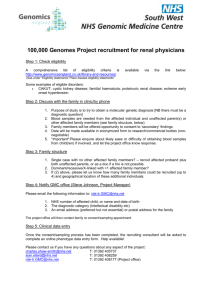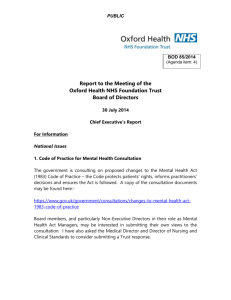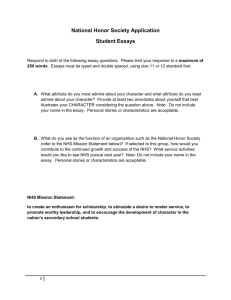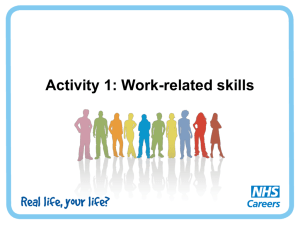the consultation paper summary here
advertisement
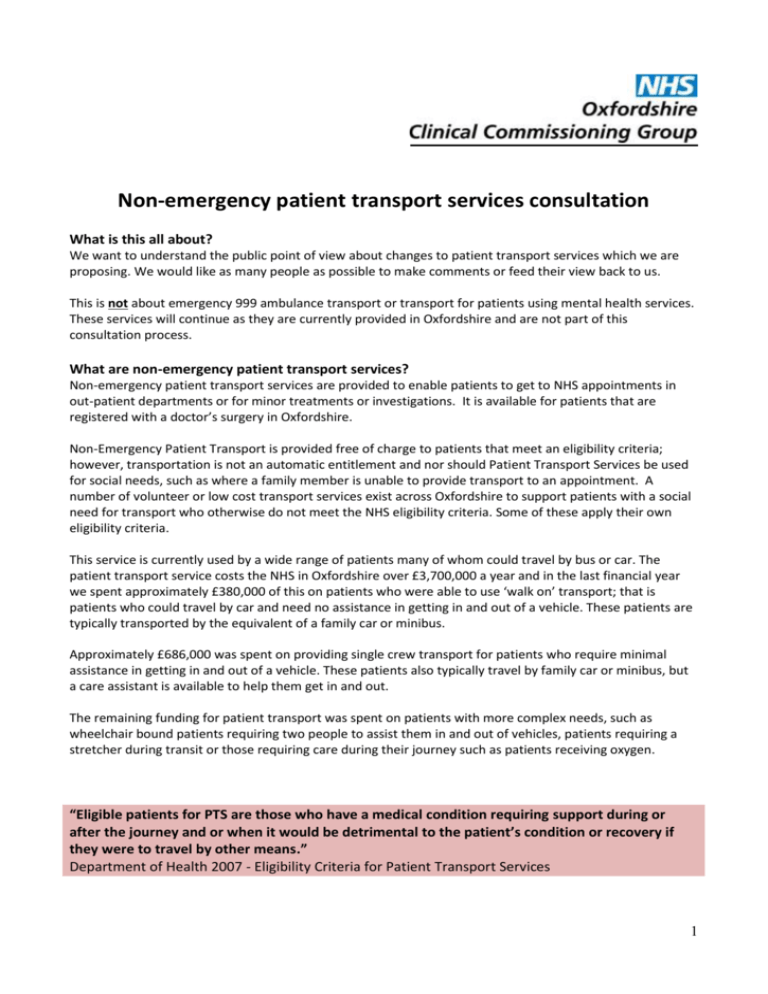
Non-emergency patient transport services consultation What is this all about? We want to understand the public point of view about changes to patient transport services which we are proposing. We would like as many people as possible to make comments or feed their view back to us. This is not about emergency 999 ambulance transport or transport for patients using mental health services. These services will continue as they are currently provided in Oxfordshire and are not part of this consultation process. What are non-emergency patient transport services? Non-emergency patient transport services are provided to enable patients to get to NHS appointments in out-patient departments or for minor treatments or investigations. It is available for patients that are registered with a doctor’s surgery in Oxfordshire. Non-Emergency Patient Transport is provided free of charge to patients that meet an eligibility criteria; however, transportation is not an automatic entitlement and nor should Patient Transport Services be used for social needs, such as where a family member is unable to provide transport to an appointment. A number of volunteer or low cost transport services exist across Oxfordshire to support patients with a social need for transport who otherwise do not meet the NHS eligibility criteria. Some of these apply their own eligibility criteria. This service is currently used by a wide range of patients many of whom could travel by bus or car. The patient transport service costs the NHS in Oxfordshire over £3,700,000 a year and in the last financial year we spent approximately £380,000 of this on patients who were able to use ‘walk on’ transport; that is patients who could travel by car and need no assistance in getting in and out of a vehicle. These patients are typically transported by the equivalent of a family car or minibus. Approximately £686,000 was spent on providing single crew transport for patients who require minimal assistance in getting in and out of a vehicle. These patients also typically travel by family car or minibus, but a care assistant is available to help them get in and out. The remaining funding for patient transport was spent on patients with more complex needs, such as wheelchair bound patients requiring two people to assist them in and out of vehicles, patients requiring a stretcher during transit or those requiring care during their journey such as patients receiving oxygen. “Eligible patients for PTS are those who have a medical condition requiring support during or after the journey and or when it would be detrimental to the patient’s condition or recovery if they were to travel by other means.” Department of Health 2007 - Eligibility Criteria for Patient Transport Services 1 Who can use non-emergency patient transport services? The current eligibility criteria, also includes patients who: require continuous oxygen during transportation require a stretcher cannot stand or walk by themselves more than a few steps and, cannot travel by public transport or in a family or friend’s car have a disability that prevents them from travelling by private or public transport have a medical condition that may deteriorate if they were to travel by private or public transport. In 2011, Oxfordshire Primary Care Trust consulted on the eligibility criteria for non-emergency patient transport services and it was agreed that patients that ‘could travel by car and need minimal assistance in getting in and out of a vehicle’ would no longer be eligible for non-emergency patient transport services. What are we proposing will change? Option A Patients capable of walking and getting in and out of vehicles unaided and patients who can walk but require minimal assistance from a single ambulance crew member to get in and out of a vehicle will no longer be eligible for patient transport - these are people who can use the equivalent of a friend’s or relative’s car, taxi, public or voluntary transport Within the walker and single crew groups we would support continuing to provide patient transport to those receiving active care or treatment at the appointment by chemotherapy, radiotherapy, renal dialysis, eye surgery, deep vein thrombosis or vascular clinic treatment, patients who are up to six weeks post-transplant and those requiring care during transit, such as oxygen. Option B We would further like to discuss with the public whether we should make those patients who are receiving support in chemotherapy, radiotherapy, renal services and podiatry but not undergoing active treatment at the appointment eligible in addition to the above. Under both options the consultation will enable opportunity to explore and highlight any further areas of eligibility the CCG should consider. Some of those options could be: to assist in making voluntary sector support available those patients no longer available for NEPTS To offer more treatments closer to home so there is less need for patients to travel to central health care destinations - this is the direction of travel of OCCG’s two and five year plan and strategy of joint funding and provision of services of partners such as Oxfordshire County Council (OCC) To work with the transport department in OCC and with partners within District Councils to understand how public transport can better support patients and meet the needs of an aging population To explore the reasons for inter-hospital transfers and determine how these could be supported in other ways or minimised To explore the potential to support patients that do not meet eligibility criteria with fee paying options. OCCG will continue explore the options above but will also seek the views of patients and the public to see if there are additional areas that could be considered. 2 What will happen if I am refused transport? If it is deemed that a patient is no longer eligible to receive NHS-funded transport, they may be entitled to claim under the NHS Health Care Travel Costs Scheme for the cost of travelling to hospital or other NHS premises for NHS funded treatment or diagnostic costs. Typically, patients in receipt of certain state benefits are able to claim under this scheme. The CCG is also working with community partners to ensure patients ineligible to receive NHS-funded transport are provided with information on alternative hospital transport services. If a patient is transported but the ambulance crew or driver believe that their medical needs do not require NHS-funded transport, then this will be fed back to the health professional that requested the transport and the patient’s GP, so that they can discuss with the patient whether transport will be needed in the future. If it is agreed that the patient does not need NHS-funded transport, they will be directed to other forms of travel, such as community based transport schemes. Why are we making these changes now? The NHS needs to ensure it spends its money wisely and fairly so that we can go on meeting the increasing demand from patients for services. These demands are increasing because: the population is getting older and typically when older may need to use health services more often, there have been advances in technology and medicine that allow patients with long term conditions or disability to live independently and manage their condition at home for longer before requiring care in hospital, patients have higher expectations of the care that they receive from the NHS and expect services to be available for longer hours and in locations closer to home. We have to make sure that we use the money we do have to the best effect to help our patients. How to get involved Take a look at the Talking Health pages on our website (https://consult.oxfordshireccg.nhs.uk). You will be asked to register before you can get all the information. Complete our questionnaire either on our webpage or available as a hard copy by contacting us as shown below. Further information is also available in the May Governing Body Papers at the following link: www.oxfordshireccg.nhs.uk/get-involved/board-meetings or by contacting: Email: cscsu.talkinghealth@nhs.net Phone 01865 334638 You can also write to us with your views at: Oxfordshire Clinical Commissioning Group Communications & Engagement FREEPOST RRRKBZBTASXU Jubilee House 5510 John Smith Drive Oxford Business Park South, OXFORD OX4 2LH 3
